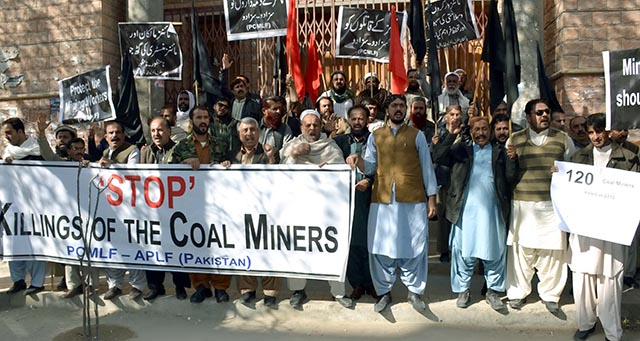Indian State Should Focus on Unconventional Methods: Jamal Nasir Baloch
Attack on Duki Coal Miners Leaves 21 Dead; Condemnations and Calls for Action

File Photo Credit: Peoples Dispatch
QUETTA: A tragic attack on the workers’ accommodation at the Junaid Coal Company mine near Duki City resulted in the deaths of at least 21 miners and injured several others in the early hours of Friday.
According to Duki Station House Officer (SHO) Humayun Khan Nasar, unknown armed miscreants launched a coordinated assault using rockets and grenades around 11:45 PM Thursday.
They targeted the mine with hand grenades and rocket launchers, subsequently opening fire on the coal miners. Haji Khairullah Nasir, the mine’s owner and Duki District Council Chairman, confirmed that the assailants also set fire to ten coal engines and other machinery.
The BBC News quoted subcontractor Hafeezullah, who reported seeing a drone with a red light as he and others hid in the bathroom. “When the attackers got closer, they shouted, ‘We told you to stop work here, why didn’t you?’,” he recounted. He noted that the attackers spoke in Pashto. “Then they opened fire.”
Hafeezullah also informed the BBC that he had been receiving threats from the ‘militants,’ but there was no prior information about the attack on Thursday night. Another eyewitness estimated that as many as 40 attackers could have been involved in the brazen assault, which lasted about an hour and a half before they vanished.
Following the incident, local authorities transported the deceased and injured to the District Headquarters Hospital in Loralai. The families of the victims and residents of Duki held a protest outside the FC main camp, demanding immediate action and safety for the coal miners.
SHO Nasar reported that all victims were Pashtun, with varying origins from both Pakistan and Afghanistan. Among the deceased, three miners hailed from the Pishin district, four from Kila Saifullah, four from Zhob, one each from Khuclak and Loralai, and four from Afghanistan. Hospital sources indicated that seven injured miners were admitted for treatment.
The Ministry of Foreign Affairs of the Islamic Emirate of Afghanistan (IEA) issued a statement strongly condemning the attack. The ministry urged the Pakistani government to take necessary measures to prevent similar incidents in the future. It directed the Afghan Consulate in Quetta to assist in repatriating the bodies of Afghan nationals.
Dr. Mahrang Baloch, a leader of the Baloch Yakjehti Committee, condemned the violence in a post on the social media platform X. Expressing her sorrow over the massacre, she stated that lawlessness in Balochistan reached unbearable levels, making it unsafe for everyone, from labourers to political activists.
She pointed out the troubling correlation between unrest and the actions of security forces, suggesting that increased violence could lead to more military presence, security operations, and corruption in the region.
“My thoughts and prayers are with those affected by last night’s tragedy,” she concluded, reflecting the sentiments of many who call for justice and accountability in the wake of this devastating event.









